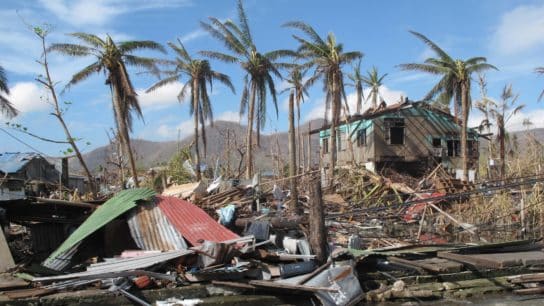On May 21, 2024, the International Tribunal on the Law of the Sea (ITLOS) made history by articulating the legal obligations of countries to protect the marine environment from climate-change related impacts. Here are the key points of the landmark Advisory Opinion and its far-reaching implications, which are expected to raise the bar for climate action.
—
We have known for a while now that our world faces a triple planetary crisis of climate change, biodiversity loss, and pollution. In spite of it, call my views progressive if you like, but I believe the need to develop and implement a more robust system of international law, for tackling a multifaceted planetary crisis, is compelling and at a climacteric (pun-unintended) stage. Advisory Opinions by international courts or tribunals can contribute to the explication of such law and carry both legal weight and moral authority, despite not being legally binding. Such advisory opinions are being recognised by legal experts as a novel mechanism for climate change litigation, which has been on the rise.
Forging a Stronger Science-Policy Nexus
To translate science into policy action requires interpreting existing law progressively and in cognizance of the latest scientific evidence. The International Tribunal on the Law of the Sea (ITLOS) did just that in its landmark Advisory Opinion (henceforth “Opinion”) on climate change and the law of the sea, issued on May 21, 2024. The Opinion, which was notably unanimous, gave legal force to the inextricable scientific link between climate change and the health of the oceans.The Opinion provides legal recognition to the Intergovernmental Panel on Climate Change’s (IPCC) latest and most dependable science on the cause-effect relationship between the accumulation of anthropogenic greenhouse gasses (GHGs) in the atmosphere on the one hand, and its manifold harmful effects on the ocean, on the other. This includes damaging effects through “sea level rise, increased ocean heat content and marine heat waves, ocean deoxygenation, and ocean acidification.”
More on the topic: Climate Change-Threatened Small Island States Hail ‘Historic’ Ocean Court Victory
It is commendable how an international court extensively and boldly lays on the line the most recent and authoritative science. ITLOS (henceforth “the Tribunal”) bases its opinion directly on an explicit acknowledgment of the robust evidence and high level of scientific consensus drawn from the IPCC’s 2023 Synthesis Report, according to which climate change effects “substantial damages and increasingly irreversible losses” in coastal and open ocean ecosystems.
The Opinion provides due weight to some of the crucial findings of the IPCC that deserve widespread attention and replication, such as:
- Human influence was very likely the main driver of the global mean sea level increase of 0.20 meters between 1901 and 2018, with the latter likely to cause the “frequency of extreme sea level events at most locations to increase.”
- It is “virtually certain” (IPCC’s scientific parlance for the assessed likelihood of an outcome) that persistent warming of the global ocean has taken place since 1970; and it can be said with a “high level of confidence” (IPCC’s scientific parlance for the degree of scientific agreement) that the oceans have taken up more than 90% of the excess heat in the climate system.
- “The pH of ocean surface water decreased by 0.1 (high confidence), corresponding to a 26% increase in acidity.” Furthermore, marine ecosystems, especially coral reefs are at risk from ocean acidification, which “has impacts on the physiology, behavior and population dynamics of organisms” and which acts synergistically with global and local changes (such as eutrophication) leading to “…complex and amplified impacts for species and ecosystems.”
- The risks, projected adverse impacts, related losses and damages from climate change “escalate with every increment of global warming” (very high confidence).
Small-Island States Request to the Tribunal
Kudos to the Commission of Small-Island States (COSIS) for requesting the Tribunal for an Advisory Opinion on very specific legal questions. COSIS requested the Tribunal to clarify the obligations of State Parties to the United Nations Convention on the Law of the Sea (‘UNCLOS’), including under Part XII, to:
(a) prevent, reduce and control pollution of the marine environment in relation to the deleterious effects that result or are likely to result from climate change, including through ocean warming and sea level rise, and ocean acidification, which are caused by anthropogenic greenhouse gas emissions into the atmosphere?
(b) to protect and preserve the marine environment in relation to climate change impacts, including ocean warming and sea level rise, and ocean acidification?
What follows are some significant findings of the Tribunal that have widespread and profound implications.
- Defining “pollution of the marine environment”
A key finding of the Tribunal was that the deleterious effects of anthropogenic GHG emissions fall within the purview of the “pollution of the marine environment,” as defined by UNCLOS. The Tribunal successfully assessed that anthropogenic GHG emissions fulfill the three cumulative criterion used by UNCLOS to define “pollution of the marine environment.” In this context, the Tribunal interprets that:
(1) Greenhouse gasses are “substances” and the term “energy” includes “thermal energy or heat” within the meaning of Article 1.1 (4) of UNCLOS;
(2) The greenhouse gas emissions in question are anthropogenic, a.k.a, produced by man, and released into a marine environment directly (as GHGs) or indirectly (as thermal energy);
(3) The introduction of carbon dioxide (a type of anthropogenic greenhouse gas emissions) and heat (an example of thermal energy) into the marine environment causes climate change and ocean acidification, which “results or is likely to result in such deleterious effects as harm to living resources and marine life,….etc,” as illustrated in Article 1.1 (4) of UNCLOS.
- Obligation of due-diligence, high standards and upholding the principle of CBDR-RC
The framework nature of UNCLOS and its open character was recognised by both the Tribunal and several States-participants at the proceedings. Of central relevance here is UNCLOS Article 194, which is broad, all-encompassing and affirmative, calling on all States “to take all necessary measures to prevent, reduce and control pollution of the marine environment from ‘any source.’”
As per the Opinion, Article 194 of UNCLOS confers an obligation of due diligence and an obligation of conduct, clearly calling on all Parties to the Convention to take all measures necessary to prevent, reduce, and control marine pollution from anthropogenic GHG emissions. The Opinion also clearly expounds that such obligation is closely connected to the precautionary approach, which is to say that the absence of scientific certainty cannot come in the way of States taking all measures necessary to regulate marine pollution from anthropogenic GHG emissions.
According to the Opinion, however, the standard of due diligence would vary depending on particular circumstances, which would include the scientific and technological information, the existence of relevant international rules and standards, the risk of harm, and the urgency involved.
Several participants to the proceedings expressed the view that the standard of due diligence for marine pollution from anthropogenic GHG emissions should be set considerably higher than any “best effort standard.” It is noteworthy that the final Opinion of the Tribunal also calls for the standard to be stringent. Simultaneously, it lends credence to the principle of Common but Differentiated Responsibilities and Respective Capabilities (CBDR–RC) by recognising that the implementation of such due-diligence would differ on the basis of the capabilities of States and their available resources. Per the Tribunal, “such implementation requires a State with greater capabilities and sufficient resources to do more than a State not so well placed.”
And yet, the principle of CBDR-RC “should not be used as a pretext to escape the responsibility that weighs on all States, both individually and collectively,..”.
- The Paris Agreement is not preemptive but informative
In a world where international environmental law is fragmented and normative conflicts can arise, the Opinion’s exhortation of the need for consistency and mutual supportiveness between UNCLOS and other rules or sources of international law, including the UNFCCC, the Kyoto Protocol, the Paris Agreement, the Montreal Protocol (including the Kigali Amendment), and others, is credit-worthy.
You might also like: Explainer: What Is the Paris Agreement?
Even more credit-worthy is the Opinion’s pronouncement that the UNFCCC and the Paris Agreement are not lex specialis’ in respect of the obligations of States Parties for climate-related action. In fact, in the words of ITLOS, States’ broad responsibilities under Article 194 of UNCLOS would not be satisfied simply by complying with the obligations and commitments under the Paris Agreement. In my view, kudos to ITLOS for recognizing the distinctiveness of each of the treaties – UNCLOS and the Paris Agreement exist separately from each other and have their own sets of obligations.

The Opinion illustrates distinctly that UNFCCC and the Paris Agreement do not preempt climate-related action under UNCLOS, but are in fact relevant in interpreting and applying the Convention. Such an interpretation upholds the general rules of treaty interpretation under Article 31 (c) (3) of the Vienna Convention, which call for taking into account “any relevant rules of international law applicable in the relations between the parties.” For instance, ITLOS opines that the temperature goal of 1.5C above pre-industrial levels and the timeline for emission pathways set out in the Paris Agreement inform the content of necessary measures under Article 194 (1) of the Convention.
Conclusion
This historic Opinion has several features with potentially far-reaching implications, not all of which can be covered with the ambit of this article. It is noteworthy that the Opinion was progressive in its interpretation of UNCLOS for States’ obligations concerning climate change and very straightforward in its application of the best available science. And as lucidly expressed by Tara Davenport of the National University of Singapore, an obligation of conduct (while not an obligation of result) is a serious and stringent standard and not one that States can hide behind. States can also use it as diplomatic leverage in any forum or as leverage nationally.
Eran Sthoeger, counsel to Timor Lester in the ITLOS proceeding, also strikingly propounds (in his private capacity), that whereas in international climate negotiations some States can carry more political weight and influence than others, advisory proceedings, on the other hard, present a unique opportunity for all countries to participate in an equal and fair way. In his words: “All States have a similar time slot and all have a similar voice and the same opportunity to influence the Tribunal or the Court. To an extent, the power dynamics and conversations behind the scenes also reflected equality.”
This article is Part 1 of a 3-part series looking at landmark, climate-related Advisory Opinions issued by international courts. Stay tuned for Part 2 and Part 3.
This story is funded by readers like you
Our non-profit newsroom provides climate coverage free of charge and advertising. Your one-off or monthly donations play a crucial role in supporting our operations, expanding our reach, and maintaining our editorial independence.
About EO | Mission Statement | Impact & Reach | Write for us














